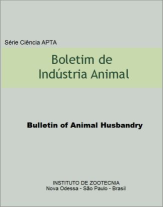Fetal sex influence in the productive performance in Holstein cows in Brazil
Keywords:
fetal sex, milk productionAbstract
In dairy farming, the productive performance of lactating cows is directly related to the efficiency of the production system. In this respect, studies in different areas investigating animal production try to understand the determinant factors of milk production. Many studies have shown a high correlation between milk production of cows and performance of their calves; however, few studies have addressed the influence of calf sex on milk production. With the objective to evaluate the influence of fetal sex on the milk production of Holstein cows, the present study analyzed cumulative milk yield data provided by the Agrindus Farm in Descalvado, São Paulo. A total of 10,780 calvings of 4,807 cows that had calved between April 2001 and October 2013 and their cumulative yields during lactation according to offspring sex were evaluated. The PROC GLM procedure of the SAS software (SAS Inst., Inc., Cary, NC) was used for analysis. The contemporary group was defined as year and month of calving, with a minimum of 5 observations per group. In addition to contemporary group, the effects of management group and calving order of the cow were included in the model. Mean cumulative yields were 9,800.79 and 9,802.95 kg for cows that had given birth to males and females, respectively. There was no significant difference (P=0.9519) in cumulative milk yield of cows during the study period as a function of fetal sex. Controversial results are reported in the literature for beef cows. In a recent study on Holstein cows, higher milk production was observed for cows that had given birth to females. Fetal sex is a determinant factor not only for milk production after calving, but also in subsequent lactations in the absence of bovine somatotropin (bST). In contrast, when bST is administered, fetal sex only exerts an influence in the first calving. In the present study, the use of bST was not included in the model, a fact that may explain the lack of a significant effect of fetal sex on the cumulative milk yield of cows. The inclusion of data regarding bST use in future analyses should contribute to a better understanding of the influence of fetal sex on milk production.Downloads
Downloads
Published
Issue
Section
License
Os autores não serão remunerados pela publicação de trabalhos, pois devem abrir mão de seus direitos autorais em favor deste periódico. Por outro lado, os autores ficam autorizados a publicar seus artigos, simultaneamente, em repositórios da instituição de sua origem, desde que citada a fonte da publicação original seja Boletim de Indústria Animal. A revista se reserva o direito de efetuar, nos originais, alterações de ordem normativa, ortográfica e gramatical, com vistas a manter o padrão culto da língua e a credibilidade do veículo. Respeitará, no entanto, o estilo de escrever dos autores. Alterações, correções ou sugestões de ordem conceitual serão encaminhadas aos autores, quando necessário. Nesses casos, os artigos, depois de adequados, deverão ser submetidos a nova apreciação. As opiniões emitidas pelos autores dos artigos são de sua exclusiva responsabilidade. Todo o conteúdo deste periódico, exceto onde está identificado, está licenciado sob a Licença Creative Commons Attribution (CC-BY-NC). A condição BY implica que os licenciados podem copiar, distribuir, exibir e executar a obra e fazer trabalhos derivados com base em que só se dão o autor ou licenciante os créditos na forma especificada por estes. A cláusula NC significa que os licenciados podem copiar, distribuir, exibir e executar a obra e fazer trabalhos derivados com base apenas para fins não comerciais.













